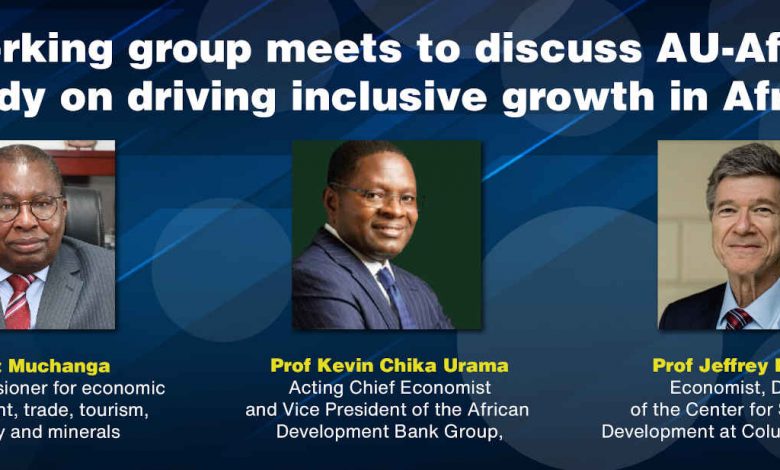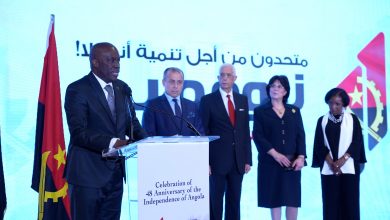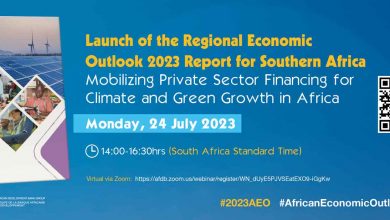Working group meets to discuss AU-AfDB study on driving inclusive growth in Africa | African Development Bank

Diplomat.Today
The African Development Bank
2023-01-18 00:00:00
——————————————-
The African Union Commission (AUC) and the African Development Bank Group concluded a technical session on how to conduct an upcoming joint study on boosting development in Africa. The purpose of the study, titled Key actions to drive inclusive growth and sustainable development in Africa, is to identify key actions that will enable Africa to rise and stay at a growth rate of 7% GDP.
Held from January 12 to 13, 2023, the meeting brought together global experts in economic development theory and practice. They included Professor Jeffrey D. Sachs of Columbia University, as well as former ministers of economics, finance and trade from across Africa.
The study was commissioned in 2020 by Moussa Faki Mahamat, former chair of the African Union Commission, and Dr. Akinwumi Adesina, Chairman of the African Development Bank Group. in African countries for the period 2023 – 2063. A growth of up to 7 to 10% in gross domestic product (GDP) implies a high degree of integration and progress towards global sustainable development goals, the High 5s strategies of the Bank Group and Agenda 2063.
Professor Kevin Chika Urama, acting chief economist and vice president for economic governance and knowledge management at the African Development Bank Group, told participants that Africa needs a new path to inclusive growth and sustainable development over the next three to four decades if the continent is to transition from low to high income.
“A minimum economic growth of 7% per annum over a period of 4-5 decades is needed to facilitate the transition of African economies from low to high income status. This is known to lift people out of poverty and achieve social, economic and environmental sustainability goals,” said Urama.
He told the experts that Africa has the potential to achieve these goals and has many strategies and policies in place to achieve them, but has not been able to sustain the growth rates needed to create enough decent jobs for citizens and the required structural transformation. to eradicate poverty in countries.
Urama noted that Africa has fallen victim to short-term prospects and erratic growth: “We have many failed starts on the continent. The research should focus on where Africa has done well and, on those areas, where countries have not understood and have not found options and actions to address them.
Before COVID-19, Africa had achieved a modest growth rate (with an average GDP growth rate of 4.6% through 2019), but it was not high enough to break the vicious cycle of poverty. With COVID-19, Africa’s real gross domestic product (GDP) growth has contracted by 1.6% in 2020, the first recession in more than 50 years. After an impressive recovery to 4.8% in 2021, Africa’s average growth is estimated to have slowed to 3.8% in 2022. Since independence, Africa’s growth story has been marked by volatility, Urama said.
Compared to the rest of the world, Urama stated that Africa has not benefited from the existing global financing architecture, with the continent’s GDP level remaining almost as low as it was in the 1960s, when most countries gained independence despite massive natural resources. potential for growth, intelligence and knowledge.
Albert Muchanga, AUC Commissioner for Economic Development, Trade, Tourism, Industry and Minerals, said the AUC intends to submit the study’s report to the African Union Summit for consideration and implementation as one of its forthcoming flagship programs of Agenda 2063.
Sachs, a world-renowned professor of economics and director of The Earth Institute at Columbia University, praised the leadership of the African Union Commission and banking group for commissioning the study, which he described as “just what Africa needs right now.” “. “A growth rate of as much as 7% continuously over 40 years is achievable and is the right target for Africa,” he noted.
Africa could replicate the experience of other countries, such as China, which achieved a growth rate of about 8% between 1980 and 2020, with an economy and population similar to Africa’s today – 1.4 billion people.
“In order for Africa to reach that growth rate, investment in Africa needs to be much higher. China averages about 40% of GDP in investment per GDP and has remained consistently high. Africa’s investment rate has been about 20%,” Sachs said.
To invest another 20 percent of GDP per year, he stressed the need for increased funding from domestic and international fronts.
The financing of this investment-led growth is significant and Africa needs investment in human capital, infrastructure capital encompassing digitization and electrification, business capital and natural capital, all of which require significant investment and targeted policies at all levels.
“Our job is to build a roadmap for growth, not just a historical analysis of what happened. It should be a roadmap that governments, especially the African Union, can deploy,” Sachs said.
Intra-regional growth in Africa is still low, while its share of global trade is minimal given the size of the market and production potential on the continent, Urama said.
Despite the many challenges – structural, governance and sectoral issues to be addressed – Urama remains optimistic that the study results, supported by the leadership of the African Union Commission and the Bank Group, will lead to the desired results.
“There are several examples of successes in Africa and elsewhere that can be used as case studies to form actionable, implementable and transformative recommendations from the study,” Urama said.
——————————————-



